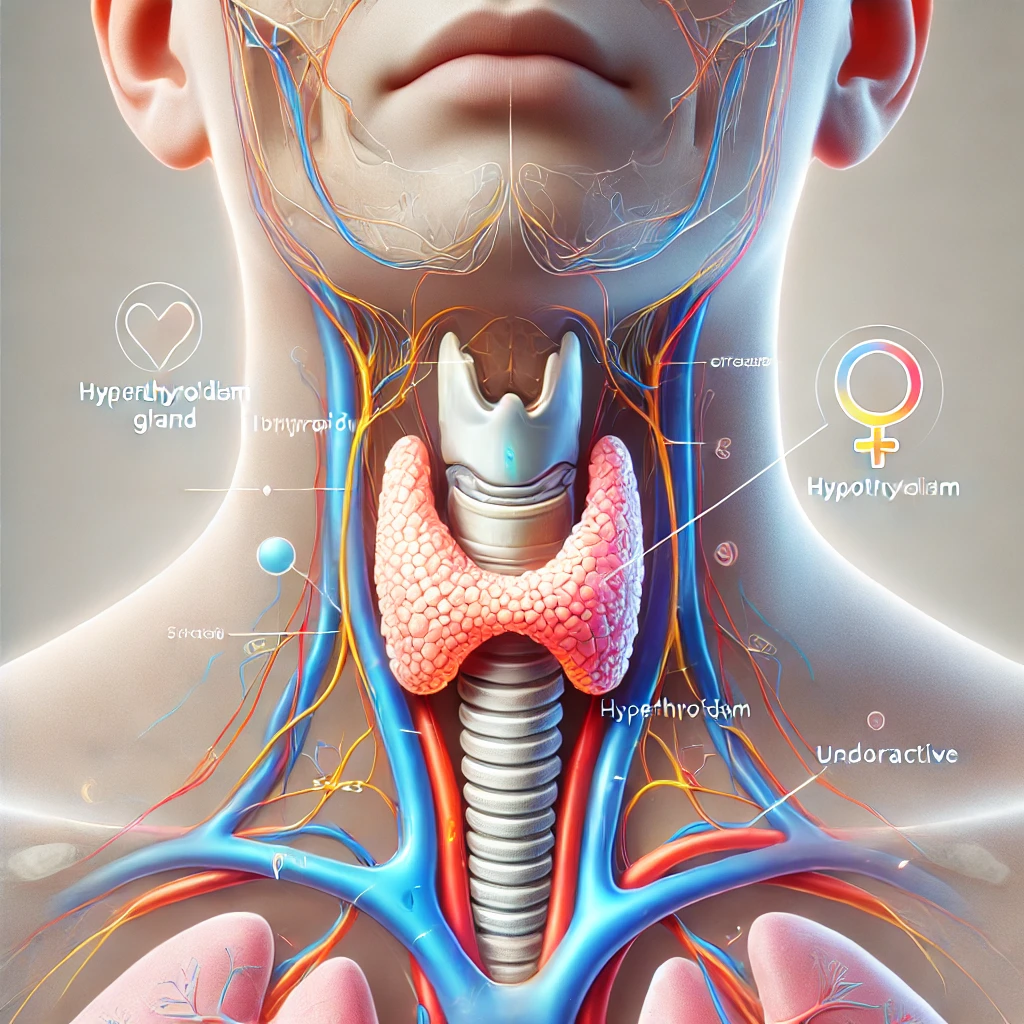From the perspective of Germanic Healing Knowledge (GHK), thyroid disorders are seen as stemming from unresolved conflicts related to feeling powerless, rushed, or unable to respond adequately to life’s demands. GHK identifies two main areas of the thyroid that respond to different types of conflicts and emotions: the thyroid gland tissue and the thyroid ducts.

Types of Thyroid Disorders and Related Conflicts in GHK:
- Hyperthyroidism (Overactive Thyroid):
- Conflict Theme: Hyperthyroidism often corresponds to a “feeling of being too slow” or not being able to act fast enough in a situation. It’s associated with feelings of urgency or a need to be more active or responsive to avoid perceived consequences.
- Biological Response: The thyroid gland increases its function to speed up metabolism, aiming to make the individual more active and capable of handling the situation or challenge. This heightened activity can lead to symptoms like rapid heartbeat, anxiety, and restlessness.
- Hypothyroidism (Underactive Thyroid):
- Conflict Theme: Hypothyroidism relates to feeling held back, restrained, or lacking in energy to confront a certain aspect of life. It may also involve a sense of not wanting or being able to move forward.
- Biological Response: The body reduces thyroid function to slow down, possibly as a response to feelings of restraint or discouragement. Symptoms like fatigue, depression, and weight gain are the body’s way of conserving energy in the face of perceived challenges.
- Thyroid Nodules and Goiter:
- Conflict Theme: These growths are linked to unresolved conflicts around feelings of powerlessness, being silenced, or having to “swallow” difficult emotions or situations. The thyroid may develop nodules or goiter in response to ongoing stress or inner resistance.
- Biological Response: Nodules or goiter represent a form of protective adaptation by the thyroid tissue in response to the recurring or unresolved conflict.
- Autoimmune Thyroid Disorders (Hashimoto’s Thyroiditis, Graves’ Disease):
- Conflict Theme: Autoimmune thyroid disorders, where the body seemingly “attacks” its own thyroid, often relate to intense feelings of self-criticism or guilt about being unable to keep up or protect oneself. There is usually a deeper conflict, such as struggling with conflicting desires or being “at war” with oneself.
- Biological Response: In these cases, the immune system’s response can be seen as an attempt to adapt to the intense inner conflict, manifesting in either a hyper- or hypo-function of the thyroid depending on the predominant issue.
How GHK Views the Healing Process for Thyroid Disorders:
In GHK, healing involves resolving the underlying emotional conflict that triggered the thyroid disorder. This means addressing the core feelings of urgency, powerlessness, or self-criticism and reprogramming the psyche’s response to these emotions.
- Awareness and Resolution: Recognizing the specific emotional conflict associated with the thyroid disorder can allow the body to naturally complete its healing cycle.
- Addressing Triggers: By working on reprogramming the habitual thoughts and reactions tied to these conflicts, individuals can lessen the intensity of their symptoms and support natural recovery.
- Supporting Inner Balance: Methods such as mindfulness, emotional release techniques, and conscious reframing of the underlying beliefs can all support the resolution of thyroid-related conflicts.
In summary, from a GHK perspective, thyroid disorders represent a biological adaptation to specific emotional conflicts. By identifying and working through these root issues, it is possible to encourage natural healing and restore balance to the thyroid.

